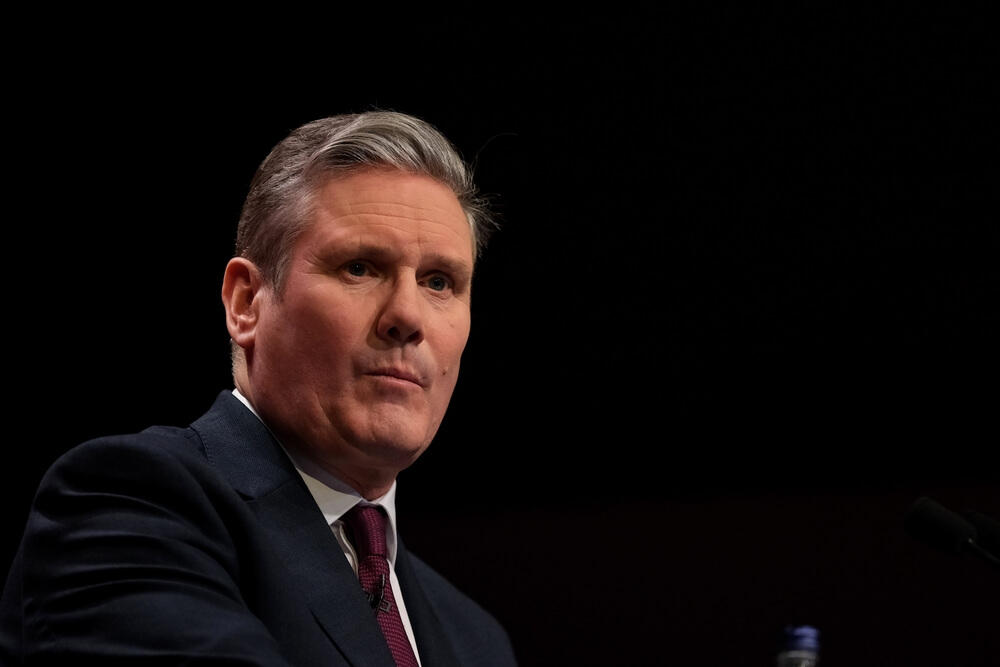One of the final initiatives of the outgoing UK government was to urge the public to stockpile food and other essentials for a possible major national emergency.
The appeal by Oliver Dowden, the deputy prime minister, was somewhat overshadowed when his boss, Rishi Sunak, took to the rain-soaked doorstep of 10 Downing Street a few hours later to announce a general election for July 4.
Sunak’s failure to take an umbrella with him might have been an indication that he had yet to digest his deputy’s injunction to Be Prepared.
The prime minister had previously signalled that national security would be a key element of his election campaign when he warned in mid-May that the next few years would be among the most dangerous the country had ever known.
That scarcely prepared voters for the announcement at the weekend that a future Conservative would reintroduce mandatory national service for all 18-year-olds in the military or the emergency services.
In his first major speech of the campaign, opposition Labour leader Keir Starmer criticised the “desperation” of the Conservatives’ national service plan, while outlining his own blueprint for safeguarding the nation in challenging times.
He said the foundation of any good government was economic security, border security and national security. “The definition of service. Can you protect this country?”
Pessimistic view of the future
So why have the two major parties honed in on security now? Is it just an election campaign gimmick or does it reflect a sober assessment of an uncertain future?
It is not clear how highlighting potential threats ranging from war to pestilence to cyber-terrorism will play out with an electorate principally focussed on such mundane concerns as the cost of living and the state of the health service.
Protecting the country and its citizens from potentially existential threats is the fundamental duty of any democratic government. It is a function of government that the public generally takes for granted until an unexpected crisis puts preparedness to the test.
Before the Covid crisis, few Britons knew that the UK had what was rated as one of the world’s best pandemic plans, while in practice it had failed to stock adequate supplies of protective equipment for medical staff.
The current government clearly believes the public has a responsibility to protect itself against emerging threats
Covid was a global phenomenon that reminded people that they live in an uncertain world. Russia’s invasion of Ukraine, reviving the spectre of war in Europe after the optimism of the post-Cold War years, has also reminded them of the danger of man-made disasters.
Add to that the warnings about the spread of uncontrolled AI and the unresolved challenge of climate change and it seems only natural that people might adopt a more pessimistic view of the future.
The current government clearly believes the public has a responsibility to protect itself against emerging threats. Deputy PM Dowden encouraged every family to maintain a stockpile of everything from fresh water to torch batteries in case of an emergency.
It is perhaps ironic that, as culture minister at the start of the Covid pandemic, Dowden told shoppers that “there is absolutely no need for anybody to stockpile” as many began hoarding ahead of the lockdown.
He said this month that the government’s risk register currently included around 100 risks, ranging from cyber attacks to solar flares.
“In a dangerous world, you’ll be safer with us”
The theme of engaging the public in participating in boosting national security is also evident in Sunak’s plan to reintroduce compulsory national service, more than 60 years after it was scrapped.
Pollsters calculate it may play well with older voters while potentially alienating the young, who might be put off by the somewhat patronising suggestion of one minister that the scheme would enable them to escape from their digital and social bubble.
 The challenge for reformed Labour party is to convince voters that it can be relied on to cope with present and future security challenges - Keir Starmer
The challenge for reformed Labour party is to convince voters that it can be relied on to cope with present and future security challenges - Keir Starmer
Generating a sense of self-reliance and public service among the general public may be a laudable aim. But it will have little impact in the absence of well-established and funded crisis management plans.
Dowden acknowledged that in the past government departments had raided emergency resilience budgets to meet immediate spending pressures. “There are always urgent, immediate spending priorities”, he said. “It’s the job of the centre to ensure that some areas are protected from those shorter-term decisions.”
As the election campaign kicked off, it was clear that the selling points pitched by both major parties would include commitments along the lines of: “In a dangerous world, you’ll be safer and more secure with us”.
The Conservatives have historically promoted themselves as the party of resilience and national defence. The challenge for Starmer’s reformed Labour party is to convince voters that it can be relied on to cope with present and future security challenges.
Starmer, who has said he puts country above party, has matched many of the Conservative commitments, including a promise to raise defence spending to 2.5 per cent of GDP.
The risk is that the rhetoric of both parties might generate a negative paranoia about the existential challenges facing the country rather than a sober and common sense attitude to rational planning for the future.
In the face of the more apocalyptic predictions, the public would be well advised to follow the advice of one proposed World War II poster that never made it off the drawing board: Keep Calm and Carry On.